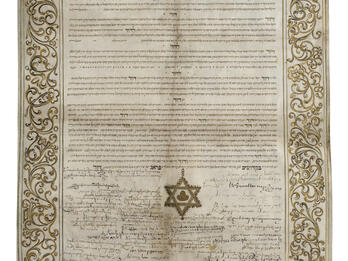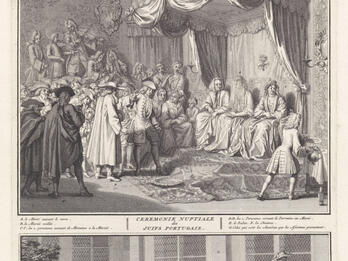Bine’ot deshe’ (In Green Pastures): On Passover
On the eve of the fourteenth [of Nisan], after reciting the evening prayer, you must light a wax candle and recite the blessing on removing your leavened foods. Then you must search in your room and in your storeroom and in your bedroom and in your storage holes and in the cracks and in your windows. You must search by the light of a candle because it is good for examining—one may not even search by moonlight nor by the light of a torch, for that is the command of your sages.
Afterward you recite [the formula in Aramaic]: “All the leavened food that is in my possession that I have not seen and that I have not removed, etc.” On the next day, in the morning of the fourteenth after the sixth hour you must nullify the leaven once again and say, “All the leavened food that is in my possession that I have not seen and that I have not removed, etc.” You must then burn it and eradicate it so that it will no longer be seen in your house all seven days of your festival, in accordance with the command of the Lord your God. After noon, in the second hour, you should occupy yourself, my son, with the mitzvah of matzah. This matzah must have been under supervision since it was reaped, for then it is considered truly to be like a sacrifice to the Lord your God. You my son should take care of all stages of its preparation—its kneading and baking and all its requirements, and then the Lord your God will accept your sacrifice like a burnt offering with a pleasant fragrance, Amen may it be His will.
You should make six matzot, three for the first night and three for the second night and you shall place a mark on them, like the order of a sacrifice, as is your custom. You shall bake them with the willow branch that you buried from the day of Hoshana Rabbah [the seventh day of the festival of Sukkot], as is the custom of the sons of the west, may my Rock preserve them and keep them alive. Afterward my son, prepare the things for the table and fine wine from your grapes and the plate so that it will be arranged as follows: your matzot, the roast dish, bitter herbs, fish, parsley and ḥaroset, an egg, and a shank bone. All must be in accordance with the commandment of your sages, as the Lord your God has already commanded you. Next, place pillows and cushions next to your table, everybody according to what he can afford. You must also purify your body from the evil impulse, which is a great unleavened thing, and prepare yourself and go with your sons to the synagogue to pray the evening prayer according to your custom. On that night you shall recite the entire Hallel and also on the second night of the Exiles.1 Thus, when you enter the house from synagogue you will find your table set like the table of the Lord your God.
Then your wife shall stand at your right side and your children on your left and you shall recite the Kiddush and everyone will stand with his cup in his hand. After you have recited the Kiddush you must sit and lean to the left side, like the son of one of your kings. In this state you shall drink the first cup, both you and those seated before you, with pillows and cushions beneath their heads. The son must wait for his teacher and for his father until they give him their permission to lean. Next, you alone shall wash your hands, and then take the parsley and a few of the other vegetables and dip them in vinegar or in the ḥaroset and distribute it among all those at the table. Recite the blessing: “Who created the fruit of earth,” and eat, after which everyone around you eats as well, while leaning to the left side. You then take the three matzot and divide the middle matzah in two, keeping half of it for the afikoman [the last food eaten at the Passover meal], while the other half you place between the two matzot to be eaten later, after reciting the blessing: “Who brings bread from the earth.” All these practices were developed by the sages of blessed memory, who explained why we do each one of these things.
Your food and drink on this night and the next day should all be at your right hand, while all the members of your household, as well as your attendants, should be sitting around you. At this stage you can begin the Haggadah: you will read to your wife and your children and your children’s children and all those seated at your table what was done for your ancestors, how He took you out of bondage to freedom, eternal freedom. You should also read the four questions starting with: “Why is this night different from all other nights, etc.” If there is no one to ask the questions, you should pose them to yourself. You must know and understand how many miracles were done for our forefathers. For “if the Holy One had not taken them out of Egypt we and our sons and our sons’ sons [would still be slaves in Egypt].”
When you begin the passage: “Why is this night different” take the plate from the table and place it behind the table, and when you come to the section: “We were slaves, etc.” return it to its place on the table. This is done in order that the watching children will ask you about it. And when you mention the phrase: “and with an outstretched arm” take in your hand the shank bone that you had placed on the plate, and likewise when you get to the list of ten plagues take a cup of wine and drip ten drops from it. For each drop say the name of a plague, in the following manner: say “blood” and throw a drop of wine into another vessel; “frogs,” and throw another drop, and thus for all of them until you have completed the ten plagues. Then wash your hands and tell the attendants of the household that they should throw that liquid out of the house.
When you say “this matzah,” take the matzah in your hand, and similarly when you say “this bitter herb.” When you arrive at the section beginning: “Therefore we,” fill all the cups with wine until you finish the section, that is, the blessing: “Blessed are You God, Redeemer of Israel” and then drink the second cup. Afterward, wash your hands, you and all those seated at your table, and bless: “On washing hands” and then recite: “Who brings forth bread” on the two whole matzot and the half matzah, but do not break them until you have also recited the blessing: “On eating matzah,” at which point you should eat and divide among everyone sitting before you. Next, take bitter herb and dip it in ḥaroset and distribute it to everyone sitting before you and bless: “on eating bitter herbs.” Then take matzah and bitter herbs together and dip them in ḥaroset and distribute it to the participants and say: “In memory of the Temple, like Hillel the Elder, who said that this is the meaning of: they shall eat it . . . with unleavened bread and bitter herbs” (Exodus 12:8).
Now it is time to enjoy your meal, all that your household had troubled and labored to prepare, while telling your children and the people of your household all about the exodus from Egypt and all the miracles that were performed for your ancestors, as best as you are able. You should eat and be satisfied and bless the Lord your God . . . who gave it to you (Deuteronomy 8:10). Continue asking questions about the exodus to all those seated before you until midnight—the more one converses about the exodus the more praiseworthy he is. You may eat all the different kinds of foods that you have prepared and drink all kinds of beverages. Afterward, eat the afikoman, you and all the participants, and recite the Grace after Meals. You are not permitted to eat or drink any more after your sacrifice, except for two cups. Take a cup and say “Blessed be the fruit of the vine” and drink, all of you. Following that cup, you are not permitted to drink any more, apart from one more cup and some water.
Now recite Hallel, from the passage of: “Pour out Your wrath” until the end, which is called the Great Hallel. Drink the fourth cup after concluding the Great Hallel and give thanks and praise to Him who chose you from the seventy nations and fed you manna for forty years, while your garments did not wear out upon you and your sandals did not wear out on your feet (Deuteronomy 29:4). He also covered you with clouds of glory and gave you the well from which to drink and He saved you from several types of snakes and scorpions until He brought you to the precious land, a land that lacks nothing. For all that, on this night we must thank and praise and extol and glorify and recount all the miracles and wonders that He performed for our ancestors and for us. We must extend our recounting of His kindnesses all night, or at least until midnight. The next day, you should rise early to go to synagogue and pray, in accordance with the arrangement of the sages in our prayer book. On this festival day it is forbidden to get drunk, so that you will be fully alert to recite the Haggadah on the second night, which is a night of watching for the Lord (Exodus 12:42).
Translated by
.
Notes
[Jews living outside of the land of Israel would observe two nights of the pilgrimage festivals, see, e.g., b. Ḥagigah 8b.—Trans.]
Credits
Solomon Adahan, “On Passover,” in Bi-ne’ot deshe’ (In Green Pastures) (Amsterdam: Naftali Hirts Loy, 1735). Republished as: Shelomoh (ben Masud) Adhan, Bi-ne’ot deshe(Zhitomir: H. Lipa, Y. Heshel, 1856), pp. 48–50.
Published in: The Posen Library of Jewish Culture and Civilization, vol. 5.








